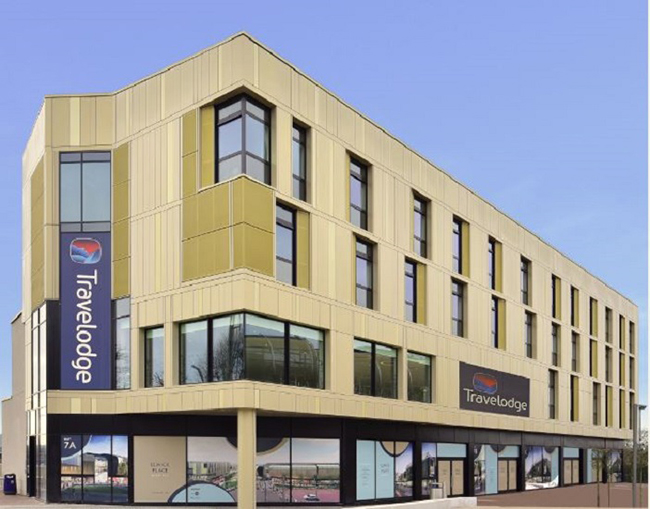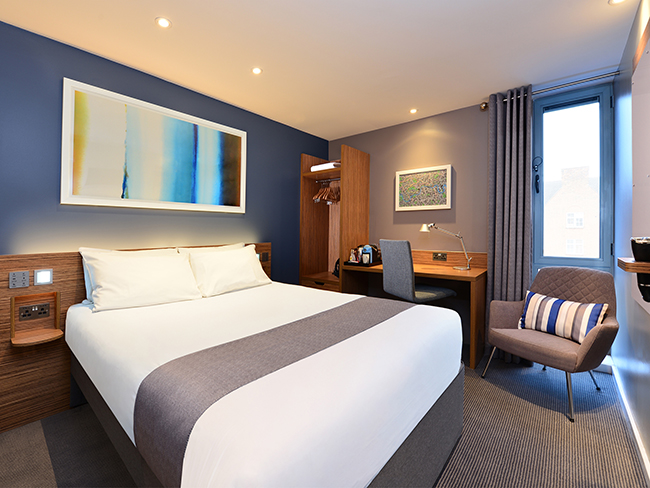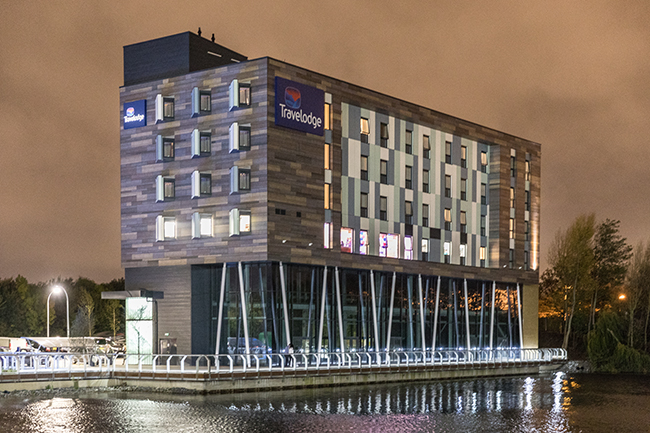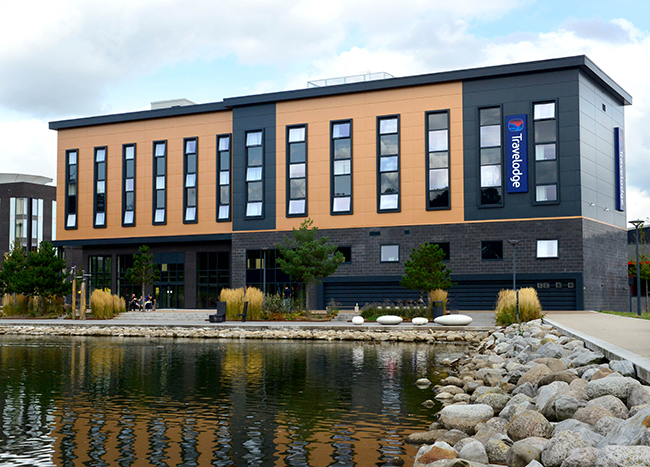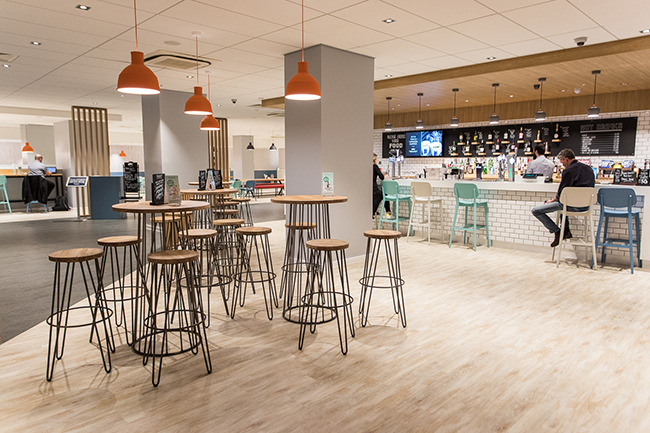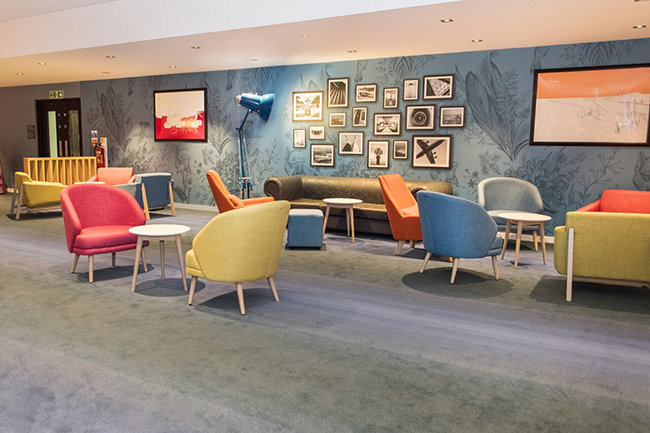Bigger and better: Peter Gowers on Travelodge's unstoppable growth
Peter Gowers, chief executive of Travelodge, talks to Katherine Price about taking a roadside hotel chain into Britain's city centres and attracting tens of millions of customers a year
"Along with Hugh Jackman, I am the other person who says a million dreams are keeping me awake at night," laughs Travelodge chief executive Peter Gowers, referencing the Hollywood actor's recent musical The Greatest Showman.
Indeed, Travelodge receives more than a million visits a week to its website, a booking almost every three seconds and more than 12 million check-ins a year.
From a roadside hotel chain to a group with nearly 600 hotels and a £95m,395-bedroom flagship property in central London, Travelodge has come a long way from its first opening in Barton-under-Needwood, Staffordshire, when Forte launched it as the UK's first budget hotel in 1985. Its portfolio now extends from Inverness to St Austell and it is one of the largest employers in UK hospitality, with around 12,000 staff.
Gowers himself has also had quite the journey. Growing up on a council estate in Essex, he went on to oversee InterContinental Hotels Group's Asia-Pacific business fromSingapore and was chief marketing officer for the entire company, before taking on the role of chief executive at storage company Safestore Holdings, finally arriving at Travelodge in 2013.
He landed at the company during a turbulent time. Travelodge was struggling with £635m of debt and had entered into a Company Voluntary Agreement. US bank Goldman Sachs and American hedge funds GoldenTree Asset Management and Avenue Capital Group had saved the group from administration with a debt-for-equity swap, taking control of the company. Bank debt of £235m was written off, 49 hotels were closed, rents were cut for more than 100 properties and £100m was invested in boosting a tired portfolio.
An ambitious five-year plan has seen turnover increase more than £250m to £680.2m and Travelodge has been ranked by The Sunday Times as one of Britain's top fastest-growing, mid-market private companies for the last three years in its Top Track 250. So, what do the next five years hold for the hotel chain?
More choice in more places
Knight Frank's annual UK Hotel Development Opportunities 2018 report found the budget hotel sector continues to dominate the market, representing 69% of all new-build hotel stock and 65% of all hotel extensions. This growth, says Gowers, is creating a larger pool of budget hotel customers who are becoming ever more demanding of both choice and quality at the same low price. As well as location, these are the core focus points for Travelodge.
A SuperRoomSuperRooms, on which Travelodge spent £5m launching in 2017, feature the addition of Lavazza coffee machines, televisions and adjustable showers" although Gowers says the most commented-on addition are the KitKats. The development of the SuperRoom was in response to increasing numbers of business customers looking for something a step above the 'standard' room. Just over half of Travelodge's revenue comes from business customers and Gowers says it is the group's "fastest-growing" group of customers.
The other biggest change in the budget sector that Gowers is seeing is more people taking shorter breaks more frequently, which has been a "big driver" for Travelodge. To meet this demand, the company has an ambitious target of 100 new hotels over the next five years;" approximately 20 hotels a year, with 16 planned to open towards the fourth quarter of this year. Gowers says he is "very confident" in achieving these targets, with almost the next two years' growth already in the secured pipeline (around 4,500 rooms).
From roadside to city centre
As for locations, the company has moved away from its roadside hotel chain image – less than 10% of its income now comes from its roadside properties – to focus on building hotels in city centres, of which the majority are new builds. He describes the entry of Soho House & Co into the roadside hotel market, with its design-focused Mollie's motel brand, as "a great addition to the market" and says it was "interesting to see somebody enter that segment". But he adds: "It may well work, but it will be small – I'm in the business of having hundreds of properties". He says his focus is "robust" design that will "last decades".
Gowers sees the hotel market consolidating over the next five to 10 years to three kinds of hotel companies: a few global majors with a larger share of the luxury and high-end market; national chains like Travelodge, with hundreds of hotels in just one country; and the small independents, with only one or two properties.
"There will be very few chains that only have five, 10 or 15 hotels… You'll either be small, or you'll be big, andyou'll either be big nationally or big globally, but you will have to be in one of those camps," he suggests.
However, the budget sector is a space in which he still sees room for growth, with occupancy up to 78.5% last year, and he describes the flagship Travelodge London City as the company's most successful ever new opening".
He says: "We all think in hospitality that everybody travels. It's true that more and more people do it, but UK households spend more money on pizza delivery than on domestic hotels. So there's a big opportunity for us to keep growing.
"Britain is a nation of budget shoppers and travel is their new treat. That gives us confidence in the long-term. The short-term, I'll have to manage all the things every restaurateur and hotelier has to manage: rising costs, taxes, the economy; but in the long run, the growth potential is very, very high."
The staffing storm
Another short-term concern is staffing – 100 new hotels means 3,000 job roles that will need to be filled: "We create somewhere between 350 and 500 jobs every year and we are almost'constantly on the lookout for new people," he says.
To meet these numbers and plug any potential gaps post-Brexit (about 27% of Travelodge's workforce is from the European Union), the company has launched two major recruitment programmes over the past six months targeting returning parents and students. Following the first recruitment drive in January – which offered guaranteed hours to fit around the school run, work buddies and access to management training – it received 43,000 job applications.
But what Gowers believes will enable Travelodge to weather the staffing storm is the career progression opportunities it can offer.' "We are to hotels what McDonald's is to food- service. We are often the first place people get 'their first experience in management," he says.
"For me, that opportunity to help people grow their careers is really important. I grew up on a council estate in Essex, my dad worked for a car manufacturer, my mum worked in a newsagent. Education revolutionised my life; I had a fantastic teacher who helped me get into Oxford University, that set me on a career path that led me to all kinds of places I never anticipated. That is one of the things the budget hotel chains can do faster than any other hotel group. In a Travelodge I can bring you in as a housekeeper and within two or three years make you a manager of a hotel."
It is important for Gowers to remain grounded and in touch with all facets of the company, from staying in the hotels and testing the sausages served for breakfast – even the vegetarian ones – to having a shadow board made up of housekeepers and team members, as well as managers and head office personnel.
"That means I am never more than an arm's length away from knowing exactly how it feels to do the job that is most important in our hotels. Six thousand people clean our hotel rooms every day. They're the most important people in our company," he says, pointing out that a report doesn't tell him that his staff prefer vacuum cleaners with rotating brush heads for picking up hair from the carpets.
"In the last five years of our transformation we've made some really big decisions that went against the trend in the industry," he adds, which he attributes to this contact with staff.
One example was when Travelodge's minimum wage employees were upgraded to the National Living Wage in April 2016. "It's expensive for Travelodge – it costs us more than £6m every year every time it goes up. But I think continuing to raise the real wages of people at the entry level jobs is vital," he says.
The group then made the decision to insource its housekeeping and eliminate zero-hours contracts in June later that year. Many hotel groups still use agencies to supply housekeeping services, particularly in London, and notably Travelodge's leading competitor Premier Inn, which with nearly 800 properties is the UK's largest budget hotel company.
Gowers says: "I wanted all those people to be part of Travelodge, because I want them on the career ladder. I want our housekeepers to have the same benefits. I can't stand it when you're on the Tube and you hear, 'would the contract cleaner please come to platform six', as if they were some sort of sub-human class.I want all the people who work at Travelodge on the frontline to feel part of our business, and so we took the decision to scrap outsourcing."
Keeping in touch with his staff on the ground and breaking down barriers includes taking part in company events and not taking himself too seriously. "I've had to dress up as Bob the Builder, one year I was Mr Carson from Downton Abbey, I've had to sing the Travelodge song onstage in front of a thousand people – we're back to Hugh Jackman again – I'm so close!" he jokes.
He also takes part in the company's annual football tournament. "I play in goal, so there is enormous competition for me because no one wants to do that in five-a-side. It's not because I'm any good;" they just want someone."
The company's financial results speak for themselves on the success of this approach, and Travelodge won Best Budget Hotel Brand at the 2019 Business Travel Awards and placed eighth in The Sunday Times Top Track 250 last year.
"Those are things I could only have dreamed of five years ago," says Gowers. "It's nice to see it coming to fruition."
It seems a long way from the hotel chain on the brink of collapse in 2012, which is perhaps a tale of hope for the many mid-market groups in UK's hospitality industry currently struggling with debt. In 2015 it was reported Travelodge's owners were exploring a sale of the business for £1b, and Gowers says this is still not off the cards.
Peter Gowers' CV
2013-present Chief executive, Travelodge Hotels, UK
2011-2013 Chief executive, Safestore Holdings, UK
2009-2011 Management consultant, UK
2007-2009 Chief executive, Asia-Pacific, InterContinental Hotels Group (IHG), Singapore
2005-2007 Chief marketing officer, IHG, London
2003-2005 Executive vice-president, global brand services, IHG, London and Atlanta, US
2001-2003 Senior vice-president, strategy, Six Continents Hotels, London
1999-2001 Strategic planning manager, Bass, London
1995-1999 Manager, Arthur D Little, London and Singapore
Peter Gowers on...
Football and The West Wing
"When you're in a business which requires a lot of energy, you've got to know how to pace yourself. I haven't worked out how to do it yet, but one day I will. In the meantime I have football and endless re-runs of The West Wing. I think I've got all 154 episodes on my iPad. And football is my big passion;" I play five-a-side football for the Beaconsfield Strollers and I'm also a Spurs season ticket holder."
EU workers
"There's a myth in hospitality that EU 27 workers are only in frontline service jobs. Some of my top EU 27 workers are people with doctorates in statistics, working in our pricing team or in our finance team."
Edinburgh's tourist tax
"Visitors will spend so much more money if they stay overnight. So for Edinburgh Council to want to introduce an anti-tourist tax is extremely surprising to me, particularly in the context of Brexit and all the risks that brings. Sending a message that Scotland's capital city is anti-tourist is a very surprising approach to take."
Continue reading
You need to be a premium member to view this. Subscribe from just 99p per week.
Already subscribed? Log In



